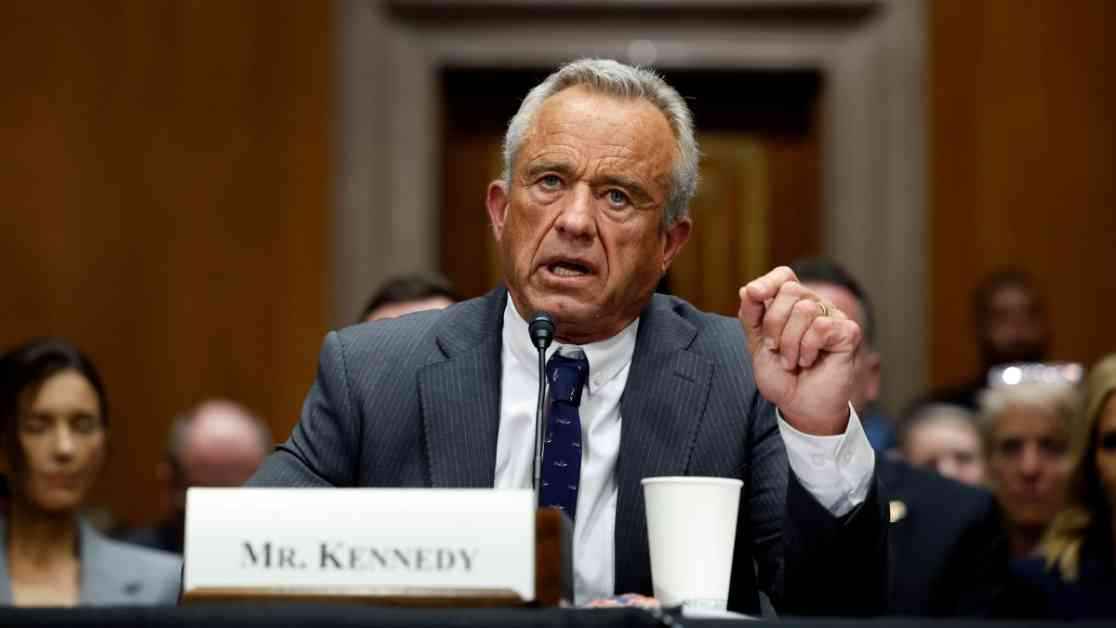Robert F. Kennedy Jr. Confirmed as Health Secretary
In a pivotal decision that sent shockwaves through the political arena, Robert F. Kennedy Jr., an esteemed anti-vaccine advocate, secured the top position as the Secretary of Health and Human Services with a razor-thin margin of 52-48 in a Senate vote dominated by party lines. The noteworthy exception was Senator Mitch McConnell, a survivor of childhood polio, who stood in opposition alongside all Democrats. McConnell, known for his unwavering decisions, emphasized Kennedy’s controversial history of promoting conspiracy theories and undermining public health credibility.
A Defining Moment in Trump’s Cabinet Nominees
The confirmation of Kennedy as the head of the nation’s most influential healthcare agency marked a significant victory for President Donald Trump, whose Cabinet-level nominees have consistently emerged triumphant in Senate hearings. The Senate’s endorsement now places Kennedy in a position of authority over a sprawling $1.7 trillion agency responsible for guiding pandemic readiness, administering government-funded healthcare services to millions, and supervising the development of vaccines and pharmaceuticals.
Navigating Political Turbulence and Overcoming Obstacles
Amidst a backdrop of political turbulence, Kennedy, hailing from the renowned Democratic lineage, faced intense scrutiny from Republican counterparts concerning his previous stances on vaccines and abortion. Notably, Senator Bill Cassidy from Louisiana, a prominent figure in the health sector, expressed reservations regarding Kennedy’s qualifications. However, after a series of consultations and assurances from Kennedy himself, Cassidy ultimately cast his vote in favor of the confirmation, citing commitments to uphold critical immunization practices and dispel misconceptions about vaccine safety.
A Unified Front and Pledges of Cooperation
Kennedy’s ascendancy to the health secretary position received crucial support from key Republican figures, including Lisa Murkowski of Alaska and Susan Collins of Maine. Their backing stemmed from Kennedy’s commitment to promoting transparent information, evidence-based vaccine recommendations, and medically sound research practices. Murkowski and Collins echoed sentiments of assurance and trust in Kennedy’s capabilities, emphasizing the importance of collaborative efforts to enhance public health outcomes.
Navigating a Complex Healthcare Landscape
The intricacies of Kennedy’s new role extend beyond the oversight of the Center for Disease Control and Prevention, encompassing leadership responsibilities across various healthcare entities such as the Food and Drug Administration, the National Institutes of Health, and the Centers for Medicare & Medicaid Services. Kennedy’s transformative journey, from a Democratic presidential candidate to an independent campaigner, underscores his dedication to revitalizing America’s health landscape through innovative policies and collaborative partnerships.
Unifying Science and Progress Amidst Controversy
While Kennedy’s advocacy for stricter regulations on food chemicals garnered bipartisan support, his contentious views on vaccines and autism posed significant challenges in garnering Democratic backing. Criticisms of perpetuating doubt about established scientific facts and hindering progress resonated during intense committee hearings, with Senator Maggie Hassan delivering a poignant address that underscored the need for consensus and evidence-based decision-making in healthcare policy.
In a political climate fraught with uncertainty, Kennedy’s confirmation as the Secretary of Health and Human Services represents a pivotal moment in shaping the nation’s healthcare agenda. As he embarks on his new role, the challenges and opportunities that lie ahead will undoubtedly test his leadership and vision for a healthier, more resilient America.


